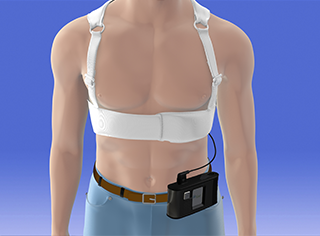Qu’est-ce qui provoque l'arrêt cardiaque soudain (ACS)?
Les épisodes d'ACS se produisent généralement sans avertissement et entraînent la mort s'ils ne sont pas traités rapidement. L'ACS est causé par des arythmies, des troubles du rythme du muscle cardiaque résultant de malformations congénitales, d'insuffisance cardiaque congestive, de maladies coronariennes et d'autres maladies.
Pour plus d'informations, ZOLL se tient à votre disposition 7/7j et 24/24h:
 |
Service d'urgence technique (disponible 24/24h) : En cas d'urgence technique ou si vous avez des questions,veuillez appeler le numéro +41 44 551 42 94 |
 |
Les formulaires de renseignements et la documentation annexe peuvent être envoyées par fax +41 44 551 42 94 |
 |
Pour plus d'informations sur la LifeVest, veuillez envoyer un e-mail à l'adresse
[email protected]
|
1Larsen MP, Eisenberg MS, Cummins RO, Hallstrom AP. Predicting survival from out-of-hospital cardiac arrest: a graphic model. Ann EmergMed. 1993;22:1652–1658.
2Dickstein K, Cohen-Solal A, Filippatos G, McMurray JJ, Ponikowski P, Poole-Wilson PA, et al. ESC Guidelines for the diagnosis and treatment of acute and chronic heart failure 2008: the Task Force for the Diagnosis and Treatment of Acute and Chronic Heart Failure 2008 of the European Society of Cardiology. Developed in collaboration with the Heart Failure Association of the ESC (HFA) and endorsed by the European Society of Intensive Care Medicine (ESICM). Eur Heart J 2008;29:2388-442.
3Facts and Figures: Heart Failure. European Society of Cardiology website. http://www.escardio.org/static_file/Escardio/Press-media/Facts-Figures-H.... Accessed April 29, 2015.
4 http://europace.oxfordjournals.org/content/11/12/1574, Huikuri. Implantable cardioverter-defibrillator therapy and the total burden of sudden cardiac death. Europace (2009) 11, 1574.







